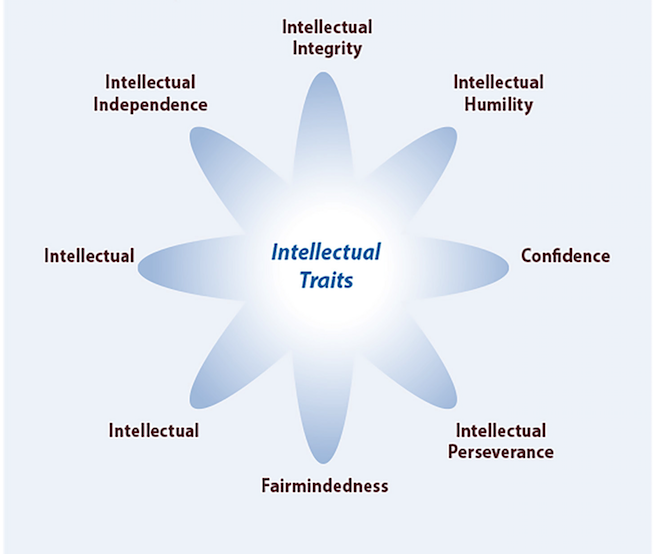
Virtuous Virtues
Commit to Intellectual Virtues: The hallmark of the
strong-sense critical thinker is the embodiment of
and deep commitment to intellectual virtues, or the
development of intellectual character. Yet, the extent to
which anyone lives in accordance with these virtues on a
daily basis is a matter of degree. No one can achieve the
status of ideal thinker, exhibiting these characteristics
at all times. This is why the most advanced thinkers see
themselves as “aspiring critical thinkers” rather than
fully “critical thinkers.”
Intellectual virtues include, but are not limited to: fairmindedness, intellectual
perseverance, intellectual integrity, intellectual humility, intellectual empathy,
intellectual courage, intellectual curiosity, intellectual discipline, confidence in reason,
and intellectual autonomy.
Intellectual traits are interdependent. Each is fully developed only in conjunction with the development of the others. They develop only through years of commitment and practice. They cannot be forced upon you, but can be cultivated through encouragement and example.
Intellectual traits are interdependent. Each is fully developed only in conjunction with the development of the others. They develop only through years of commitment and practice. They cannot be forced upon you, but can be cultivated through encouragement and example.
By working through the activities in this section you will
begin to better understand intellectual virtues and how
to develop them. Many of these activities were slightly
modified from activities that can be found in the book:
Critical Thinking: Tools for Taking Charge of your Professional and Personal Life
by Linda Elder and Richard
Paul (2014, Upper Saddle River, NJ: Prentice Hall). This book is also recommended for deeper
understanding of intellectual virtues.
Video Series
Intellectual Virtues
Critical thinking is not just a set of intellectual skills. It is a way of orienting oneself in the world, and a way of approaching problems that differs significantly from that which is typical in human life. People may have critical thinking skills and abilities, yet still be unable to enter viewpoints with which they disagree. They may have critical thinking abilities, yet still be unable to analyze the beliefs that guide their behavior. They may have critical thinking abilities, yet be unable to distinguish between what they know and what they don’t, to persevere through difficult problems and issues, to think fairmindedly, and to stand alone against the crowd. This video collection focuses on intellectual traits that transform the mind - virtues that foster the development of fairmindedness, intellectual humility, intellectual perseverance, intellectual courage, intellectual empathy, intellectual autonomy, intellectual integrity, and confidence in reason.
View Videos in the Series
Critical thinking is not just a set of intellectual skills. It is a way of orienting oneself in the world, and a way of approaching problems that differs significantly from that which is typical in human life. People may have critical thinking skills and abilities, yet still be unable to enter viewpoints with which they disagree. They may have critical thinking abilities, yet still be unable to analyze the beliefs that guide their behavior. They may have critical thinking abilities, yet be unable to distinguish between what they know and what they don’t, to persevere through difficult problems and issues, to think fairmindedly, and to stand alone against the crowd. This video collection focuses on intellectual traits that transform the mind - virtues that foster the development of fairmindedness, intellectual humility, intellectual perseverance, intellectual courage, intellectual empathy, intellectual autonomy, intellectual integrity, and confidence in reason.
View Videos in the Series
Activities for Virtuous Virtues:
- Strong Sense Versus Weak Sense Critical Thinking
- Articulate Your Own Definitions Of Intellectual Virtues
- Distinguish Intellectual Humility From Intellectual Arrogance
- Identify Your Prejudices
- Distinguishing What You Know For Certain From What You Do Not Know
- Target Your Assertions
- Examining Your Groups’ Beliefs
- When Have You Defended A Popular But Irrational Belief?
- Consider The Opposite Of Intellectual Courage – Intellectual Cowardice
- Reconstructing Arguments In Good Faith
- Create A Plan For Practicing Intellectual Empathy
- When Have You Been Hypocritical?
- When Have You Been Inconsistent Or Contradicted Yourself?
- Imagine A World Where People Embody Intellectual Integrity
- Intellectual Perseverance
- Identify Blind Faith In Your Past
- Identify A Failure In Reasoning On Your Part
- When Have You Been Intellectually Autonomous? When Have You Lacked Intellectual Autonomy?
- Articulate The Interrelationships Between And Among Intellectual Virtues
Distinguish Strong Sense (Ethical) Critical Thinking From Weak Sense (Unethical) Critical Thinking
Intellectual Humility Versus Intellectual Arrogance
Develop Intellectual Courage
Develop Intellectual Empathy
Intellectual Humility Versus Intellectual Arrogance
Develop Intellectual Courage
Develop Intellectual Empathy
Develop Intellectual Integrity
Develop Intellectual Perseverance
Develop Confidence In Reason
Develop Intellectual Autonomy
Develop Intellectual Perseverance
Develop Confidence In Reason
Develop Intellectual Autonomy
Read
more
about intellectual virtues before beginning these activities...
Top ▲
